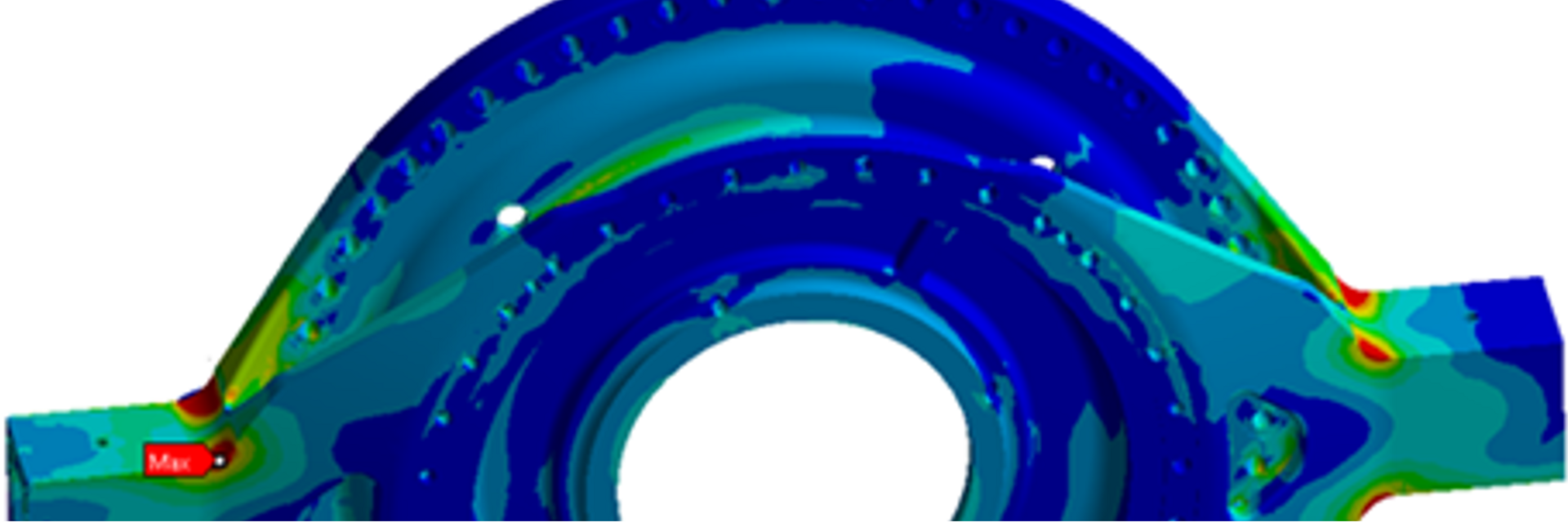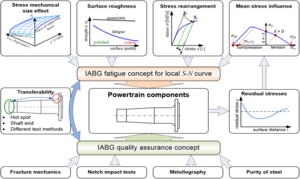- Home
- Services
- Testing & Qualification
- Virtual & Hybrid Testing
- Fatigue Strength: Concepts and Method Development
- Home
- Services
- Testing & Qualification
- Virtual & Hybrid Testing
- Fatigue Strength: Concepts and Method Development
Fatigue Strength: Concepts and Method Development
Precise fatigue strength assessment and the seamless integration of testing and simulation are indispensable in today’s development landscape. We accelerate your development processes while enabling resource-efficient lightweight components. Our expertise helps maximize the performance density of highly stressed components, allowing you to complete your product development faster, more cost-effectively and with greater reliability - from the initial concept phase to final qualification and validation.
Our Services
Support During Operational Measurements
Precise Data Acquisition for Well-Founded Design Principles and Decisions
We provide comprehensive support in planning, instrumentation and execution of operational measurements to accurately capture and analyze real loads. Our experienced team guides you through every step of the process, ensuring that your measurements are both reliable and insightful.
- Customized planning support:
We collaborate with you to develop tailored measurement plans that align precisely with your specific requirements and operating conditions. - Professional instrumentation:
We equip your systems with advanced measurement technology, ensuring precise data capture and secure data transfer through protected channels (data pipelines). - Execution and monitoring:
Our experts oversee the operational measurements on-site or remotely monitor transmitted data to ensure smooth execution and immediate response to any unforeseen events. - Data analysis and evaluation:
Following the measurement, we assist you in analyzing the data and deriving actionable recommendations to further optimize your operational processes.
With our comprehensive support in operational measurements, you gain not only precise data but also valuable insights that enhance the reliability and efficiency of your systems.
- Customized planning support:
Determination of design-relevant load scenarios
"Optimal Design Through Customized Load Scenarios"
We support you in deriving design-relevant and damage-equivalent load scenarios, which are crucial for the precise dimensioning and qualification of your products. Whether dealing with direct loads or vibration-excited components, we analyze and combine various driving maneuvers and their frequencies to replicate realistic load conditions.
- Identification of design-relevant components:
Identification of those components from the measurement signals that are relevant for your specific applications. Damage input, peak values and possible emission are of central importance here. - Combination of driving maneuvers:
Determination of application-specific scenarios by combining different driving maneuvers with their effect and frequency. - Derivation of test scenarios with equivalent effects:
Development of simplified test procedures that precisely simulate the real operating conditions using the equivalent effects approach, thus enabling significantly more efficient and reliable qualification of your products.
With our expertise, we ensure that your products are optimally designed to function reliably even under the most demanding conditions.
- Identification of design-relevant components:
Acquisition of material properties
Acquisition of Material Properties: Reliable Characteristic Values Under Real Conditions
Precise knowledge of the local load-bearing capacity of materials is crucial for the successful realization of lightweight components. Technological effects from production (e.g. forging, casting, injection molding, laminating, additive manufacturing), environmental influences (temperature, humidity, UV radiation, various media) as well as operational conditions (static or cyclical loads, medium stress) and the design (stress concentrations due to notches or stiffness jumps) play a significant role in the material properties.
In our state-of-the-art Material and Fatigue Strength Laboratory we capture material properties and qualities with the highest precision. Our advanced instrumental analysis capabilities - including residual stress measurements, computed tomography, metallography, and scanning electron microscopy (SEM/EDX) - allow us to identify design-relevant failure mechanisms. Our systematic failure analysis provides a detailed understanding of the specific conditions in the failure zone, establishing a solid foundation for material selection and optimization.
Development of innovative design concepts
From Proven Methods to Future-Oriented Concepts: Tailor-Made Solutions for Highly Stressed Structures
For the design and dimensioning of highly stressed structures, we utilize a combination of established commercial FE and fatigue post-processing tools (e.g. ABAQUS, ANSYS, OptiStruct, NASTRAN, FEMFAT, nCode) alongside in-house developed solutions. Our aim is to maximize the performance and reliability of your products through bespoke concepts.
In method development, we focus on creating innovative design concepts tailored specifically to the fatigue-resistant dimensioning of new material systems (e.g. fiber composites) or manufacturing processes (e.g. additive manufacturing, large-scale casting). We also consider previously overlooked factors and damage mechanisms to enhance power density and fully exploit lightweight construction potential.
Beyond conventional design methods, we develop probabilistic approaches that account for statistically distributed imperfections. This includes assessing internal cracks, integrating both stress-based and fracture mechanics perspectives into our analyses. Our portfolio also includes methods to address general statistical variations in quality and manufacturing (effects of defects) to ensure more precise and reliable designs.
Through targeted test planning, we characterize a wide range of influencing factors and integrate these insights into existing design concepts. This approach ensures that your structures are not only compliant with current standards but are also equipped for future challenges.
Derivation of quality assurance concepts
Development of Targeted Quality Assurance Concepts: Precision and Efficiency in Quality Assurance
Based on the assumptions and material characteristics defined in the design concept, we develop targeted and efficient quality assurance concepts. Our approach combines advanced instrumental analysis methods with statistical procedures to reliably ensure the transferability of your products while maintaining a sufficient confidence level.
This combination ensures that your quality assurance processes are both precise and efficient, guaranteeing maximum reliability and product quality.
The following figure illustrates the material models assumed for the computational fatigue strength verification of a highly stressed area (hotspot). Correlations with efficient analyses of areas distant from the hotspot are used to validate that the real component aligns with these assumptions.
Model validation and calibration
The Right Parameters for Well-Founded Decisions
To validate and calibrate your developed models, we design tailored and efficient tests using appropriate sensor technology. Our approach includes both local measurements (e.g. strain gauges and thermocouples) and area measurements (e.g. optical measurement technology with GOM or ARAMIS). Additionally, we offer combinations of physical measurements and virtual simulations, including indirect measurements and virtual sensor technology.
By comparing the measured signals with your simulation results, you can achieve:
- Deeper insights into your system’s mechanisms:
Gain a comprehensive understanding of the exact relationships and dynamics represented in your model. - Identification of potential limitations in your models:
Detect weaknesses in material models or design elements to target and optimize them effectively. - Validation of the suitability and applicability of your modeling guidelines:
Ensure that your models are robust, reliable and suitable for long-term application.
From individual strain gauges to the optically measured overall deformation of an aircraft, our support ensures that your models are not only valid but also practically applicable and future-proof.
- Deeper insights into your system’s mechanisms:
Your Added Value
More Efficient Development Processes:
Our innovative design concepts and fatigue strength assessments accelerate your development processes, resulting in faster and more cost-effective outcomes.
Sustainable Lightweight Solutions:
Through precise measurement and optimization of material properties, we enable resource-efficient lightweight components with optimized limit values and maximum performance density.
Informed Decision-Making:
Our comprehensive measurement and simulation services provide deep insights into the operating mechanisms of your systems, offering reliable data and analyses as a foundation for well-founded decisions.
Maximum Product Quality:
With targeted quality assurance concepts, we ensure that your products meet design criteria during implementation and deliver long-lasting performance.
How can we help you?
Please fill in the form and we will get in touch with you as soon as possible.


